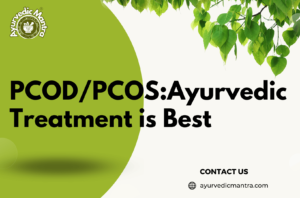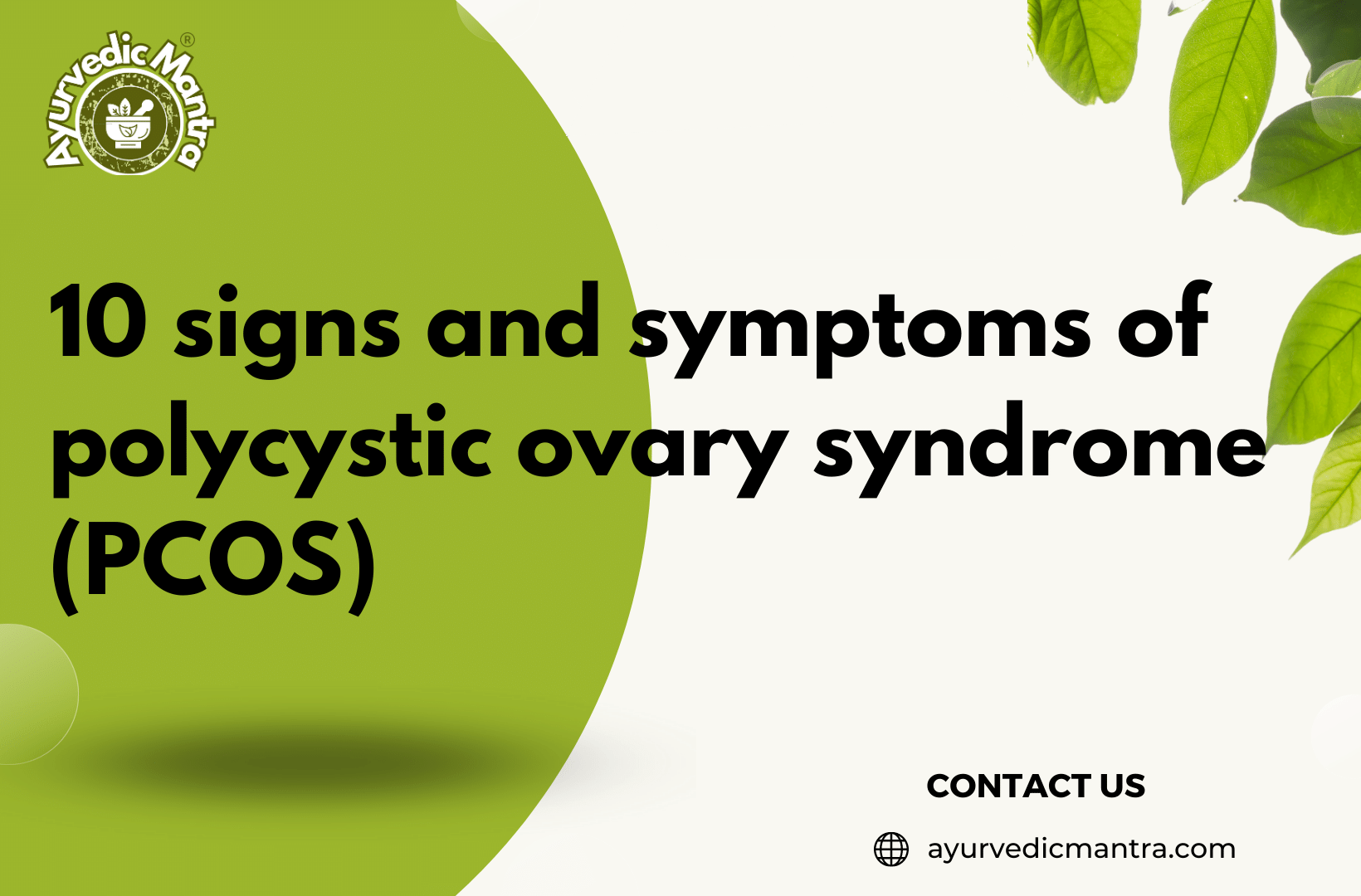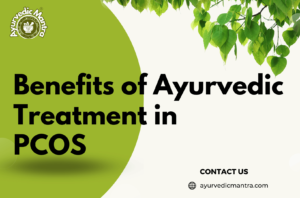
PCOD/PCOS: Ayurvedic Treatment is Best
Introduction Polycystic Ovary Disorder (PCOD) or Polycystic Ovary Syndrome (PCOS) is a common endocrine disorder affecting millions of women worldwide. It leads to hormonal imbalances,

Polycystic Ovary Syndrome, commonly known as PCOS, is a complex hormonal disorder that affects many women worldwide. It’s essential to be aware of the signs and symptoms of PCOS, as early diagnosis and management can significantly improve a woman’s quality of life. In this article, we’ll delve into the ten key indicators that may suggest the presence of PCOS.
One of the hallmark signs of PCOS is irregular periods. Women with PCOS often experience unpredictable menstrual cycles, with periods occurring too frequently, infrequently, or even prolonged periods of amenorrhea (absence of menstruation). This irregularity is typically caused by hormonal imbalances that disrupt regular ovulation.
Excess hair growth, medically referred to as hirsutism, is another common symptom of PCOS. This condition is characterized by the growth of coarse, dark hair on the face, chest, back, and abdomen. It occurs due to elevated levels of androgens, often called “male hormones,” in the body.
PCOS-related hormonal imbalances can lead to the development of acne and oily skin. Increased androgen levels stimulate the sebaceous glands, causing them to produce more oil. This excess oil can clog pores and result in the formation of pimples, blackheads, and whiteheads.
Many women with PCOS struggle with weight management. The hormonal imbalances associated with the condition can contribute to weight gain, particularly around the abdominal area. Conversely, some women with PCOS may experience difficulty gaining weight. Achieving and maintaining a healthy weight is crucial for managing PCOS symptoms.
Insulin resistance is when the body’s cells do not respond effectively to insulin, leading to elevated blood sugar levels. PCOS and insulin resistance often go hand in hand. The body compensates for this resistance by producing more insulin, which can result in weight gain and an increased risk of type 2 diabetes.
Hair thinning and male-pattern baldness, known as androgenic alopecia, can affect women with PCOS. Like hirsutism, elevated androgen levels contribute to hair loss and can lead to a receding hairline or thinning at the crown of the head.
Hormonal fluctuations in PCOS can influence mood and emotional well-being. Many women with PCOS report experiencing mood swings, irritability, and even symptoms of depression. These emotional challenges can be attributed to both hormonal imbalances and the impact of living with a chronic condition.
PCOS has been linked to sleep disturbances, such as sleep apnea and insomnia. Hormonal fluctuations and weight gain associated with the condition can contribute to disrupted sleep patterns. Addressing sleep issues is essential for overall health and PCOS management.
PCOS is a leading cause of infertility in women. Irregular or lack of ovulation can make it difficult for women with PCOS to conceive. Fortunately, various fertility treatments and lifestyle interventions are available to improve the chances of conception for those affected by PCOS.
Some women with PCOS may experience pelvic pain, particularly during menstruation. A dull ache or sharp twinges often characterize this pain and is typically caused by ovarian cysts, fluid-filled sacs that can develop on the ovaries.
In conclusion, recognizing the signs and symptoms of PCOS is crucial for early diagnosis and effective management. If you or someone you know is experiencing any of the indicators above, seeking medical attention and guidance is highly recommended. PCOS is a complex condition, and a multidisciplinary approach involving healthcare providers, dietitians, and mental health professionals can significantly enhance the quality of life for those affected by this hormonal disorder. Early intervention and proactive care are essential to effectively managing PCOS and its associated symptoms.
A1: Polycystic Ovary Syndrome (PCOS) is a hormonal disorder affecting women’s reproductive system. Various symptoms characterize it, such as irregular menstrual cycles, excessive hair growth, acne, and weight fluctuations. PCOS is often accompanied by hormonal imbalances, specifically elevated androgens levels, typically considered male hormones.
A2: PCOS is one of the most common hormonal disorders affecting women of reproductive age. Approximately 5-10% of women worldwide have PCOS, making it a prevalent health concern. Despite its common occurrence, many cases of PCOS go undiagnosed or are misdiagnosed, highlighting the need for awareness and early detection.
A3: The exact cause of PCOS is not fully understood, but it is believed to result from genetic, environmental, and lifestyle factors. Insulin resistance, a condition in which cells do not respond effectively to insulin, is often associated with PCOS and contributes to various symptoms.
A4: PCOS can present a wide range of symptoms, including irregular menstrual cycles, excessive hair growth (hirsutism), acne, weight fluctuations, insulin resistance, male-pattern baldness, mood swings, sleep disturbances, fertility issues, and pelvic pain. The severity and combination of symptoms can vary significantly among individuals.
A5: PCOS is typically diagnosed through medical history assessment, physical examination, and laboratory tests. These tests may include hormone level assessments, ultrasound imaging of the ovaries, and evaluation of insulin sensitivity. Healthcare providers need to rule out other conditions that can mimic PCOS symptoms before making a definitive diagnosis.
A6: Yes, PCOS can significantly impact fertility. Irregular or lack of ovulation can make it difficult for women with PCOS to conceive. However, many women with PCOS can still achieve pregnancy with the help of fertility treatments, lifestyle modifications, and medical interventions aimed at regulating ovulation.
A7: The treatment approach for PCOS is tailored to each individual’s specific symptoms and needs. Lifestyle changes, such as adopting a balanced diet, engaging in regular physical activity, and managing stress, can be crucial in managing PCOS. Additionally, medications may be prescribed to address specific symptoms, such as hormonal contraceptives for regulating periods, anti-androgen medications for hirsutism and acne, and insulin-sensitizing drugs for managing insulin resistance.
A8: While PCOS cannot be prevented, adopting a healthy lifestyle can help reduce the risk of developing severe symptoms. Maintaining a balanced diet, staying physically active, managing stress, and maintaining a healthy weight can contribute to overall hormonal balance and may mitigate some of the effects of PCOS.
A9: Yes, PCOS is associated with certain long-term health risks. Women with PCOS have an increased risk of developing type 2 diabetes due to insulin resistance. They may also be at a higher risk for heart disease, high blood pressure, and endometrial cancer. Regular medical check-ups and adherence to recommended treatments can help mitigate these risks.
A10: Yes, research on PCOS is ongoing, aiming to understand better the underlying causes, effective treatments, and potential preventive measures. Scientists and medical professionals continuously work to improve our knowledge of PCOS to enhance early detection, management, and overall patient care. Staying informed about the latest research can benefit individuals affected by PCOS and their healthcare providers.

Introduction Polycystic Ovary Disorder (PCOD) or Polycystic Ovary Syndrome (PCOS) is a common endocrine disorder affecting millions of women worldwide. It leads to hormonal imbalances,

Introduction Losing weight is a journey that requires dedication, consistency, and self-care. While there are numerous weight loss techniques out there, not all of them

Polycystic Ovary Syndrome (PCOS) is a hormonal disorder that affects millions of women worldwide. It can lead to various health complications, such as irregular periods,

In recent years, Ayurveda, an ancient system of natural healing originating from India, has gained significant popularity as an alternative approach to treating various health

आजकल वजन बढ़ने और चर्बी की वृद्धि होने की समस्या एक आम समस्या बन गई है। बढ़ते वजन और अतिरिक्त चर्बी के कारण न केवल

प्रस्तावना: आजकल वजन बढ़ने और ओबेसिटी की समस्या एक आम समस्या बन गई है। बढ़ते वजन के कारण न केवल शारीरिक समस्याएं होती हैं, बल्कि
